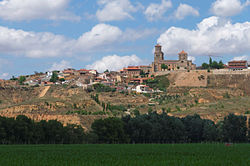Toro, Zamora
| Toro | ||
|---|---|---|
| Municipality | ||

Collegiate church of Santa María la Mayor
|
||
|
||
| Location in Spain | ||
| Coordinates: 41°31′32″N 5°23′28″W / 41.52556°N 5.39111°WCoordinates: 41°31′32″N 5°23′28″W / 41.52556°N 5.39111°W | ||
| Country |
|
|
| Autonomous community |
|
|
| Province | Zamora | |
| Comarca | Toro | |
| Judicial district | Toro | |
| Government | ||
| • Mayor | Tomás del Bien Sánchez (PSOE) | |
| Area | ||
| • Total | 326 km2 (126 sq mi) | |
| Elevation | 740 m (2,430 ft) | |
| Population (2013) | ||
| • Total | 9,421 | |
| • Density | 29/km2 (75/sq mi) | |
| Demonym(s) | Toresanos | |
| Time zone | CET (UTC+1) | |
| • Summer (DST) | CEST (UTC+2) | |
| Postal code | 49800 | |
| Dialing code | 980 | |
| Website | Official website | |
Toro is a town and municipality in the province of Zamora, part of the autonomous community of Castile and León, Spain. It is located on a fertile high plain, northwest of Madrid at an elevation of 740 metres (2,430 ft).
Toro is known as a center of Mudéjar art and as a wine-producing region. It is located on the Duero River roughly halfway between Zamora, the provincial capital and Tordesillas in the province of Valladolid. The four-lane freeway (autovía) A-11 now connects these two cities and passes just north of Toro. Highway N122 passes through the town. The distance to Madrid by highway is 220 km (137 mi). Distances to other cities are: 32 km (20 mi) to Zamora, 62 km (39 mi) to Valladolid and 72 km (45 mi) to Salamanca.
Toro is an ancient town, possibly the Arbukala of the Vaccai tribe which was conquered by Hannibal in 220 BC but survived to trouble the Romans. The Roman town was called Albucella. The modern name may derive from the bull totem of that Celtiberian people. In the 8th century it was conquered by the Moors. After the Muslims had been partially rolled back, Alfonso III repopulated the town in about 910.
Ferdinand III was crowned King of León in Toro in 1230 and his wife Elisabeth of Hohenstaufen (Beatriz) died here. Enrique II, first of the Trastámara line, summoned his first Cortes here in 1369. Juan II of Castile was born here in 1404, but the town was to have greater significance for his daughter Isabella I of Castile.
...
Wikipedia


